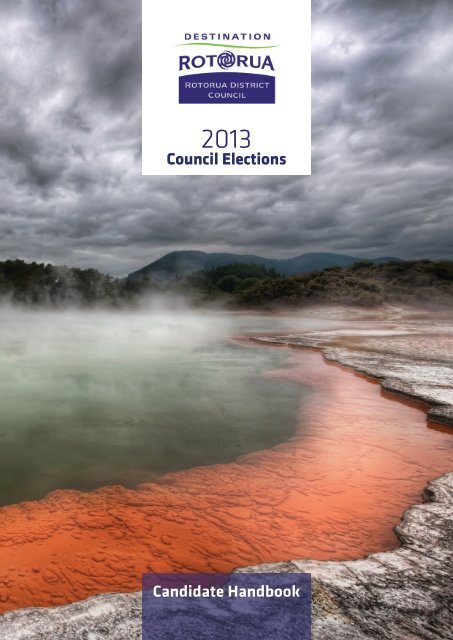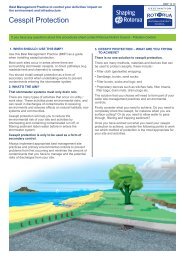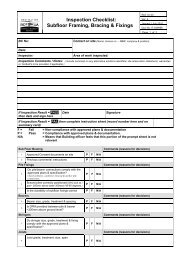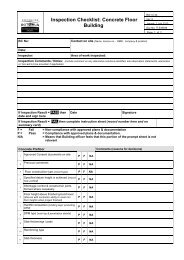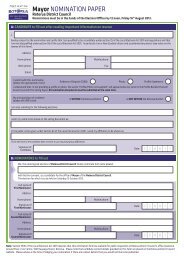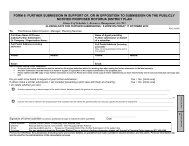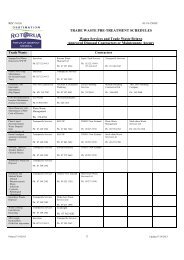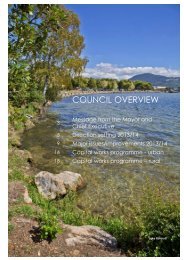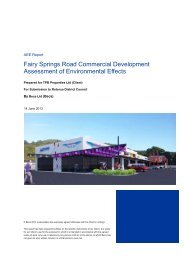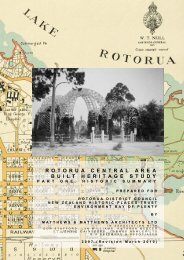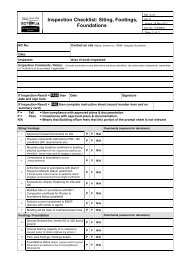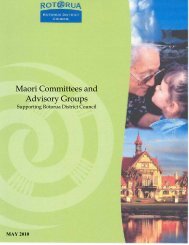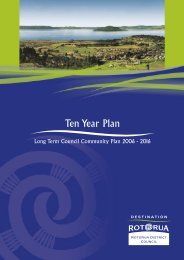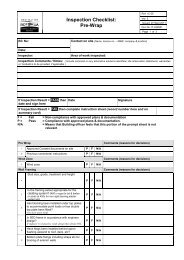Candidate Handbook Council Elections - Rotorua District Council
Candidate Handbook Council Elections - Rotorua District Council
Candidate Handbook Council Elections - Rotorua District Council
You also want an ePaper? Increase the reach of your titles
YUMPU automatically turns print PDFs into web optimized ePapers that Google loves.
ContentsElection Timetable 32013 Local Government Election Timetable 3Introduction 4Electoral Officer Appointment 4About electionz.com 4Electoral Officer – Warwick Lampp 4Role of Electoral Officer 4Election Principles 4Key Dates 5Changes to the Legislation in 2013 6Nominations 6<strong>Candidate</strong> Withdrawals 6Expenses and donations 6Election Issues 7<strong>Rotorua</strong> <strong>District</strong> <strong>Council</strong> (RDC) 7Bay of Plenty Regional <strong>Council</strong> (BOPRC) 7Waikato Regional <strong>Council</strong> (WRC) 7Lakes <strong>District</strong> Health Board (LDHB) 7Population Statistics 7Electoral Staff 7<strong>Rotorua</strong> <strong>District</strong> <strong>Council</strong> (RDC) 7Bay of Plenty Regional <strong>Council</strong> – (BOPRC) 7Waikato Regional <strong>Council</strong> – (WRC) 7Lakes <strong>District</strong> Health Board (BOPDHB) 7<strong>District</strong> Leaders Information 8Members’ Remuneration 8Mayor & <strong>Council</strong>lors’ Responsibilities 8Mayor & <strong>Council</strong>lor – Base role description 8- Collective duties of the council 8- Representation and advocacy 8- Governance 8- Core Competencies 9- Experience and Background 9- Personal Qualities 9<strong>Council</strong> Structure 9Members Interests 9Inaugural Meeting 9Declaration by Mayor and <strong>Council</strong>lors 10Electoral Systems 11Electoral Roll 11<strong>Candidate</strong> Eligibility 12A candidate for local authority elections must be: 12Restrictions on candidates for local authority elections: 12Nominations 13Completion of Nomination Paper 13Other Names 13Titles 13Residency in Area 13Affiliation 13Submitting the Nomination Documents 13<strong>Rotorua</strong> <strong>District</strong> <strong>Council</strong>’s office hours for lodgement are: 13Nomination Deposits 13<strong>Candidate</strong> Withdrawals 14<strong>Candidate</strong> Profile Statements 15<strong>Candidate</strong> Profiles 15Correctness of Profile Statements 15Format of <strong>Candidate</strong> Profile Statements 15Format of <strong>Candidate</strong> Photos 16Translations 16Campaigning 17Election Advertising 17Campaign Expenditure Limits: 17Return of Electoral Expenses: 18Electoral Donations: 18vote.co.nz 19Election Signs 20<strong>Rotorua</strong> <strong>District</strong> <strong>Council</strong>’s Rules on Election Signs (Hoardings) 20Voting and Processing of Votes 21Order of <strong>Candidate</strong>s on the Voting Papers 21Special Voting 21Early Processing of Returned Voting Papers 21Election Results 21<strong>District</strong> Map 22<strong>Rotorua</strong> Lakes Community Board Map 23Appendix 1 - <strong>Candidate</strong> Profile Statements 24Local Authority <strong>Elections</strong> 2013 24Duties, Powers and Responsibilities of Electoral Officers in Respect of<strong>Candidate</strong> Profile Statements 25Distribution of <strong>Candidate</strong> Profile Statement 25Appendix 2 - Return of Electoral Donations and ExpensesForm 26Appendix 3 - Scrutineers 28Role of Scrutineers 28Appointment of Scrutineers 28Declaration 28Information to be Supplied by Electoral Officer 29Arrangements for Roll Scrutiny, Preliminary and Official Counts andany Recount 29Restrictions on Scrutineers During Election and Poll Processes 29Conduct of Scrutineer 29Offences 30Appendix 4 - Appointment of Scrutineer 31Appendix 5 - Election Offences 32Local Electoral Act 2001 32Electoral Expenses 35General Provisions 35
Election Timetable2013 Local Government Election Timetable17 July (Wednesday) Public Notice of Election – <strong>Rotorua</strong> Daily Post and <strong>Rotorua</strong>Review19 July (Friday) Nominations open, Electoral roll open for inspection16 August (Friday) Nominations close at 12 noon , Electoral roll closes21 August (Wednesday) Public Notice of <strong>Candidate</strong>s – <strong>Rotorua</strong> Daily Post and <strong>Rotorua</strong>Review23 August (Friday) EO receives final Electoral Roll dataBy 16 September (Monday)EO compiles and certifies final Electoral Roll20 September (Friday) Electoral Services letter sent to electors on Unpublished Roll20 September (Friday) Delivery of ordinary voting documents startsOrdinary and special voting opens20 September to 12 October Voting Period11 October (Friday) Last day for appointment of Scrutineers - by 12 noon12 October (Saturday) Election Day - Voting closes at 12 noonProgress Results available as soon as practicable after close ofvoting12 – 16 October Official Count – process special votes18 October (Friday) Final Results announcedPublic notice of official declaration of election result –<strong>Rotorua</strong> Daily Post and <strong>Rotorua</strong> Review(or as soon as practicable thereafter)12 December 2013 Return of election expense declaration forms(55 days after date of Declaration of Results)<strong>Council</strong>sElected members of <strong>Council</strong> will be sworn in at the inaugural <strong>Council</strong> meeting on Wednesday 30 October 2013.<strong>Rotorua</strong> Lakes Community BoardElected members of <strong>Rotorua</strong> Lakes Community Board (RLCB) will be sworn in at the inaugural RLCB meeting on Thursday31 October 2013.Disclaimer: Every effort has been made to ensure that the information contained in this booklet is accurate and consistent withthe Local Electoral Act 2001 and its amendments. <strong>Rotorua</strong> district <strong>Council</strong> takes no responsibility for any errors or omissions.It is recommended that candidates obtain a full copy of the Act, which can be purchased from any Government Bookstore orviewed on-line at www.legislation.govt.nz.Election Helpline 0508 440 021 3
IntroductionThis booklet outlines information which may be of interest toyou as a candidate or elector to the 2013 local body elections.It has been prepared as a guide to assist possible candidatesand others interested in election issues with generalinformation on the election. It should be used as a guideonly, and candidates or other persons requiring more detailedinformation should contact the Electoral Officer or DeputyElectoral Officer directly.The Deputy Electoral Officer is Kathryn Phillips. Kathryn is theLegal Property Officer at <strong>Rotorua</strong> <strong>District</strong> <strong>Council</strong>.The Local Electoral Act 2001, its amendments and regulations,is the presiding legislation for local government elections. Itcovers all matters pertaining to the conduct of the electionsincluding voting methods, voting systems, nominationrequirements, electoral roll requirements, length of votingperiod and progressive processing period, candidate profiles,offences, and campaign expenditure limits. All candidatesshould familiarise themselves with the Act its recentamendment and the information as set out in this document.No responsibility is taken for the accuracy of informationin this pack or candidates failure to comply with legislativerequirements.Copies of the Local Electoral Act 2001 its amendments and itsregulations are available from the Government Bookshop, orthey can be viewed on the internet at www.legislation.govt.nz.Electoral Officer Appointment<strong>Rotorua</strong> <strong>District</strong> <strong>Council</strong> has engaged electionz.com Ltd as theelections contractor for the 2013 Local Government Election.Warwick Lampp, has been appointed Electoral Officer onbehalf of electionz.com by the <strong>Council</strong>. This is the second timethat Warwick has been <strong>Council</strong>’s Electoral Officer, the firstbeing the 2011 By-election.This means that electionz.com are handling all matterspertaining to the election for <strong>Rotorua</strong> <strong>District</strong> <strong>Council</strong>.electionz.com is based in Christchurch from where most of theelection administration will be carried out, but Warwick lives inTauranga.The processing of voting papers is being carried out inTauranga.About electionz.comelectionz.com, New Zealand’s premier election company,provides public and private sector election services forcouncil, producer boards, companies, associations, non-profitorganisations, schools, universities and companies.For the 2013 local body elections electionz.com will beprocessing voting papers for thirty-eight councils, for both FirstPast the Post (FPP) and Single Transferable Voting (STV). Theprocessing of voting papers is being carried out in Tauranga.electionz.com also provides Returning Officer services oncontract to private and public organisations, as well as internetvoting, internet surveys, and telephone voting.Electoral Officer – Warwick LamppWarwick Lampp, Electoral Officer, has extensive localgovernment and Electoral Officer experience from thirteenyears working for Rangitikei, Papakura and Central HawkesBay <strong>District</strong> <strong>Council</strong>s. Warwick has been Returning Officeror Electoral Officer for more than 900 elections in the lastthirteen years for many public and private organisations in NZ,including many private sector elections such as Fonterra CooperativeGroup, Beef & Lamb New Zealand, TECT, WEL EnergyTrust, Balance Agri-nutrients, Ravensdown, DairyNZ etc.This year electionz.com is Electoral Officer for twenty <strong>Council</strong>sand five <strong>District</strong> Health Boards.Role of Electoral OfficerThe role of the Electoral Officer (EO) is to conduct the electionin accordance with the legislation.The EO has complete and final control over how the election iscarried out. The EO is employed by <strong>Council</strong> and is accountableto the Chief Executive of the <strong>Council</strong>, but does not takedirection from the CE, the Mayor or councillors.The EO is responsible for all staff, systems, resources, policies,procedures and actions to ensure that the democratic processis carried out with utmost integrity, security and fairness for allparties.The conduct of local body elections is strictly regulated bylegislation including:• Local Electoral Act 2001• Local Electoral Amendment Act 2013• Local Electoral Regulations 2003• Local Government Act 2002• Sale of Liquor Act 1989• NZ Public Health and Disability Act 2000• Local Authorities (Members Interests) Act 1968Specific duties of the Electoral Officer as outlined in Section 15of the Local Electoral Act are:• The compilation and certification of electoral rolls• The publication of any public notice relating to electionsand polls• Calling for and receiving nominations, candidate profilestatements and deposits• Issuing and receiving of ordinary and special votes• Processing and counting of votes• Declaration of results• Receiving and dealing with returns of electoral expenses.Queries regarding the actions or performance of the ElectoralOfficer for <strong>Rotorua</strong> <strong>District</strong> <strong>Council</strong> should be directed toGeoff Williams, Chief Executive, <strong>Rotorua</strong> <strong>District</strong> <strong>Council</strong> on07 348 4199.Election PrinciplesThe Electoral Principles contained in section 4 of the LEA areoutlined below. The principles must be taken into account inthe conduct of any election or poll.“4 Principles(1) The principles that this Act is designed to implement are4
the following:(a) fair and effective representation for individuals andcommunities:(b) all qualified persons have a reasonable and equalopportunity to —(i) cast an informed vote:(ii) nominate 1 or more candidates:(iii) accept nomination as a candidate:(c) public confidence in, and public understanding of,local electoral processes through—(i) the provision of a regular election cycle:(ii) the provision of elections that are managedindependently from the elected body:(iii) protection of the freedom of choice of votersand the secrecy of the vote:(iv) the provision of transparent electoral systemsand voting methods and the adoption ofprocedures that produce certainty in electoraloutcomes:(v) the provision of impartial mechanisms forresolving disputed elections and polls.(2) Local authorities, electoral officers, and other electoralofficials must, in making decisions under this Act or anyother enactment, take into account those principlesspecified in subsection (1) that are applicable (if any), sofar as is practicable in the circumstances.”Key DatesElection Expenditure Monitoring BeginsNominations OpenNominations CloseSpecial VotingDelivery of Voting PapersVoting ClosesElection Results announcedOfficial Declaration12 JulyFriday 19 July12 noon, Friday 16 August20 September to 12 noon on 12 October at <strong>Rotorua</strong> <strong>District</strong><strong>Council</strong>20 to 25 September12 noon, 12 OctoberAs soon as possible after 12 noon on 12 OctoberExpected to be Thursday 17 OctoberReturn of Electoral Expense Declarations No later than 11 December 2013Election Helpline 0508 440 021 5
Changes to the Legislation in 2013The new legislation in 2013 streamlines the nominationprocess, improves the quality and availability of informationabout candidates, and tightens and increases transparencyabout campaign donations.The key changes are:• Nomination period now a week earlier• Nominations documents must now all be submittedtogether• <strong>Candidate</strong>s must state if they standing for any otherelections• <strong>Candidate</strong>s must state if they reside in the election areaor not• Changes to candidate withdrawal process• <strong>Candidate</strong> profiles can now be made publicly availableearlier• <strong>Candidate</strong> expenditure returns must be made availableelectronically by the EO• Anonymous donations over $1,500 not permittedNominations• Nomination Period brought forward a week• Nominations open Friday 19 July• Nominations close at midday Friday 16 August• There is an extra week for EOs to compile votingpapers and profiles – voter packs go out Friday20 September• All nomination documents must be submitted together• Nomination paper, profile statement, photo, $200deposit• Cannot put a nomination paper in first week, andleave profile/photo until the last week• EOs will accept online banking of deposits, butevidence of the online transaction must be provided• Disclaimer on nomination paper for candidatesto acknowledge that contact details will be publicinformation• <strong>Candidate</strong>s must state if standing in any other elections inNZ• Mayor, Ward/At Large <strong>Council</strong>, Community Board,Licensing Trust, <strong>District</strong> Health Board, other<strong>Council</strong>s, applies to standing anywhere in NZ• Details are now shown at top of the candidateprofile statement, but is not included in the 150words• <strong>Candidate</strong>s must update earlier nomination form ifnot originally included• <strong>Candidate</strong> must state if they reside in area of election ornot• My principal place of residence is WITHIN / is NOTWITHIN the area• This is shown at the top of the profile statement, butis not included in the 150 words<strong>Candidate</strong> WithdrawalsA candidate cannot strategically or politically withdraw afternominations have closed.This is now the same as for parliamentary elections, only deathor incapacity are valid reasons for withdrawal. A medicalcertificate must be provided by the candidate or their agent,after which the $200 deposit is refunded.Expenses and donationsEssentially these are now the same rules as for parliamentaryelections, where there is no such thing as an “anonymous”donation if known who it has come from.Someone cannot give a donation and ask for it to beanonymous. Anonymous means the candidate does not knowwho it came from, and cannot reasonably work it out. A thirdparty who passes on a donation must disclose who the donoris.A truly anonymous donation cannot be over $1,500. If it is, thecandidate can only keep $1,500 of it, the balance over $1,500must be given to the EO which is then deposited into the<strong>Rotorua</strong> <strong>District</strong> <strong>Council</strong> general funds account.A donation made up of contributions (e.g. to a Trust) is treatedas one donation, and cannot be over $1,500.It is an offence to circumvent $1,500 limit, ie by deliberatelysplitting up a donation into smaller contributions.The EO must make expenditure returns and supportingdocuments available electronically, i.e. on the council websitefor 7 years.All these changes are covered in more details later in thisdocument.6
Election Issues<strong>Elections</strong> will be held in October for the following issues:<strong>Rotorua</strong> <strong>District</strong> <strong>Council</strong> (RDC)(a) Election of Mayor of the <strong>Rotorua</strong> <strong>District</strong>(b)(c)Election of Twelve (12) <strong>Council</strong>lors of the <strong>Rotorua</strong> <strong>District</strong><strong>Council</strong> at largeElection of four (4) Community Board members for the<strong>Rotorua</strong> Lakes Community BoardBay of Plenty Regional <strong>Council</strong> (BOPRC)Election of two (2) <strong>Council</strong>lors to represent the <strong>Rotorua</strong>constituency and one (1) <strong>Council</strong>lor to represent Okurei Māoriconstituency on the Bay of Plenty Regional <strong>Council</strong>.Waikato Regional <strong>Council</strong> (WRC)Election of one (1) <strong>Council</strong>lor to represent the Taupā-<strong>Rotorua</strong>constituency, one (1) <strong>Council</strong>lor to represent Ngā Tai ki UtaMāori constituency and one (1) <strong>Council</strong>lor to represent theWaihou constituency on the Waikato Regional <strong>Council</strong>.Lakes <strong>District</strong> Health Board (LDHB)Election of seven (7) Members on the Lakes <strong>District</strong> HealthBoard.The Lakes <strong>District</strong> Health Board (LDHB) election will also beconducted at the same time as the <strong>Council</strong> and Regional<strong>Council</strong> elections. There are seven members to be elected atlarge across the DHB area, which covers <strong>Rotorua</strong> and Taupo<strong>District</strong>s. There is a separate <strong>Candidate</strong> <strong>Handbook</strong> for theLDHB available from the DHB Electoral Officer, Warwick Lampp,free phone: 0508 440 030, or from the Deputy Electoral Officer<strong>Rotorua</strong> <strong>District</strong> <strong>Council</strong>.Population StatisticsElectoral Staff<strong>Rotorua</strong> <strong>District</strong> <strong>Council</strong> (RDC)Electoral OfficerWarwick Lampp, electionz.com Ltd, PO Box 3138,CHRISTCHURCH.Phone: 0508 440 021Email:rotoruadc@electionz.comDeputy Electoral OfficerKathryn Phillips, <strong>Rotorua</strong> <strong>District</strong> <strong>Council</strong>, Private Bag 3029,ROTORUA.Phone: 07 351 8330Email:kathy.phillips@rdc.govt.nzBay of Plenty Regional <strong>Council</strong> – (BOPRC)Electoral OfficerCindy Butt, Bay of Plenty Regional <strong>Council</strong> (BOPRC), PO Box364, WHAKATANE.Phone 0800 368 267Fax: 0800 368 329Email:cindy@envbop.govt.nzWaikato Regional <strong>Council</strong> – (WRC)Electoral OfficerMaureen Poole, Waikato Regional <strong>Council</strong> (WRC), Private Bag3039, HAMILTON.Phone 07 859 0780Email:maureen.poole@waikatoregion.govt.nzLakes <strong>District</strong> Health Board (BOPDHB)Electoral OfficerWarwick Lampp, electionz.com Ltd, PO Box 3138,CHRISTCHURCH.Phone: 0508 440 030Email:lakesdhb@electionz.comRDC WardsEst Resident Population asat 30 June 2012Mayoralty 68,800<strong>Rotorua</strong> At Large 68,800<strong>Rotorua</strong> Lakes CommunityBoard2,920These elections will be conducted by postal voting.Election Helpline 0508 440 021 7
• Identifying, being aware of and declaring any potentialpersonal conflicts of interest, whether of a pecuniary ornon-pecuniary nature.Core Competencies• Genuine interest, understanding (and passion) of/for theissues faced by <strong>Rotorua</strong> district citizens.• Ability to relate to wide range of people at many levelsand across many disciplines and cultures.• Ability to hear and understand the varying positions ofothers and consider these in decision making.• Ability to express ideas clearly.• Ability to understand, focus on and resolve complexissues through long term planning.• Ability to understand financial and reporting statements.• Understands the differing roles of governance andmanagement.• Ability to think “city-wide” on issues to come to decision.• Be results focused.• Knowledge of and commitment to the Local GovernmentAct 2002.Experience and Background• May have experience relevant to the challenges facing thecity.• May have extensive community networks.• Be familiar with the existing <strong>Rotorua</strong> <strong>District</strong> <strong>Council</strong>’s2012-2022 Long Term Plan (LTP) or otherwise known asthe Ten Year Plan.Personal Qualities• Demonstrates integrity and ethical behaviour.• Is independent, inquisitive and innovative.• Has the ability to see all sides of an argument.• Is hard working and can work unsupervised.• Ability to develop and maintain positive workingrelationships with councillors and staff.• Committed to <strong>Rotorua</strong> district.• Sense of humour.• Respect for others.• Flexible working hours, some evening and weekend workis required.• Actively demonstrate commitment to the ElectedMembers’ Code of Ethics.<strong>Council</strong> Structure<strong>Council</strong>’s current committee structure and meetingarrangements were determined by <strong>Council</strong> in November2010, and this structure provides an open and accountablegovernance system.Elected members are guided and advised, formally andinformally, through a number of mechanisms. The LocalGovernment Act 2002 and other legislation provide theframework within which members are elected and mustoperate.<strong>Council</strong> has adopted a ‘Guide to Good Governance’, whichincludes a code of conduct to help ensure transparency anda high standard of behaviour. Model standing orders are alsoused to guide meeting procedures and assist sound decisionmaking processes.<strong>Council</strong> has established several standing committees andsubcommittees to carry out its various tasks. These include:• <strong>Council</strong>• Corporate and Customer Services Committee• Economic and Regulatory Services Committee• Infrastructure Services Committee• <strong>Rotorua</strong> Lakes Community Board• Te Arawa Standing Committee• Tourism Committee• Executive Committee• Audit CommitteeOther Committees:<strong>Council</strong> also has Subcommittees, Boards and Working Partiesto deal with particular issues as required.Members InterestsProspective candidates should be aware of the requirements ofthe Local Authorities (Members’ Interests) Act 1968.• Under Section 3 of the Act, elected members may not beconcerned or interested in contracts made by the <strong>Council</strong>when payments made for the contracts entered intoduring a particular year exceed $25,000 including GST.That amount may only be exceeded if the <strong>Council</strong> haseither obtained the prior approval of the Audit Office or,in special circumstances, obtained retrospective approval.When payments exceed $25,000 or any other approvedamount, the elected member concerned is automaticallydisqualified from office. He or she also commits anoffence if they continue to act as a member.• Under Section 6 of the Act, elected members may notdiscuss or vote on any matter in which they have apecuniary interest when it is being considered by the<strong>Council</strong> or a committee. Elected members failing toobserve this prohibition commit an offence and can beprosecuted. Conviction leads to disqualification fromoffice.• When a matter is raised at a meeting of the <strong>Council</strong> or acommittee in which a member has a pecuniary interest,the member prohibited from voting or discussing thematter must declare the pecuniary interest. The factof that disclosure and abstention from discussion andvoting on it is also recorded in the minutes. While it isnot necessary to withdraw from the meeting, it is goodpractice to do so.Inaugural Meeting• The successful candidates will take office on the dayafter the Electoral Officer gives his official notificationof the result of the election. However, no person ispermitted to act as a member of the <strong>Council</strong> beforeElection Helpline 0508 440 021 9
making a declaration. This declaration will be made atthe Inaugural Meeting, which is expected to be heldon 30 October 2013. Newly elected members will becontacted by staff with the key dates.• The business to be conducted at that meeting willinclude:• The making and attesting of declarations required of theMayor and <strong>Council</strong>lors. Traditionally, this has been aceremonial occasion.• A general explanation of the Local Government OfficialInformation and Meetings Act 1987 and other lawsaffecting elected members.• The fixing of the date and time of the first ordinarymeeting of the <strong>Council</strong>, or the adoption of the scheduleof ordinary meetings.• Election of the Deputy Mayor.• If elected the declaration required to be made by theMayor and <strong>Council</strong>lors is as follows:Declaration by Mayor and <strong>Council</strong>lorsI declare that I will faithfully and impartially, and according to the best of my skill and judgement, execute and perform, inthe best interests of <strong>Rotorua</strong> district <strong>Council</strong>, the powers, authorities, and duties vested in or imposed upon me as Mayor(or as a member) of the <strong>Rotorua</strong> district <strong>Council</strong> by virtue of the Local Government Act 2002, the Local Government OfficialInformation and Meetings Act 1987, or any other Act.10
Electoral SystemsTwo electoral systems will be operating side by side for the2013 local government elections. These are:• First Past the Post (FPP)• Single Transferable Voting (STV)Organisations using FPP in 2013 are:• <strong>Rotorua</strong> City <strong>Council</strong>• Bay of Plenty Regional <strong>Council</strong>• Waikato Regional <strong>Council</strong>Organisations using STV in 2013 are:• Lakes <strong>District</strong> Health BoardBriefly, the FPP electoral system consists of the following:• Electors vote by indicating their preferred candidate(s)with a tick.• Voters must not tick more than the number of places tobe filled.• The candidate that receives the most votes is declaredthe winner, regardless of the proportion of votes thatcandidate obtained.Briefly, the STV electoral system consists of the following:• Voters receive a single (transferable) vote irrespective ofthe number of vacancies.• Voters rank the candidates in order of preference, bywriting a “1” next to the name of their most preferredcandidate, then a “2” next to the name of the nextpreferred candidate and so on.• Voters can rank as few or as many candidates as theywish.• To be elected, a candidate must reach a “quota” of votes,which is based on the number of vacancies and thenumber of valid votes.• When votes are counted, all the first preferences areallocated first.• A candidate who reaches the quota first is elected. Ifthere is more than one vacancy, and a candidate getsmore votes than the quota, a proportion of each votefor that candidate is transferred to the voter’s secondpreference. If, as a result, another candidate gets morevotes than the quota, a proportion is transferred to thethird preferences, and so on.• If insufficient candidates reach the quota after the firstpreferences are allocated and any surplus votes aretransferred, then the candidate who received the fewestvotes is eliminated and each vote for that candidateis transferred to the voter’s second preference. Thisprocess is repeated until enough candidates reach thequota to fill all the vacancies.More information on STV can be accessed from theDepartment of Internal Affairs website www.stv.org.nz.Electoral RollThe preliminary electoral roll will be compiled during July 2013.Copies of the preliminary electoral roll for the election willbe available for public inspection from 8.30 am Friday 19 July2013 to 5 pm Friday, 16 August 2013 at the Civic Centre, 1061Haupapa St, <strong>Rotorua</strong>.Any alterations to the residential roll, should be made:• by completing the appropriate form at any PostShop or• by telephoning 0800 ENROLNOW (0800 367656) or• by accessing the Electoral Enrolment Centre website onwww.elections.org.nz.A hard copy of the preliminary electoral roll may be purchasedfrom the Electoral Officer for $90 for the whole district(ratepayer roll included) plus GST.The final electoral roll is produced once the preliminaryelectoral roll closes on 16 August 2013. The final electoral rollis the roll used for issuing voting papers. Copies of this roll maybe purchased as above.Details appearing in the electoral roll are electors names(surname, then first names) listed alphabetically. Thequalifying address, postal address, occupation, meshblock andentitlements for each are shown alongside.Information contained on the electoral roll is not available fromthe Electoral Officer in an electronic form, but candidates orpolitical parties may request an electronic listing of residentelectors from Electoral Services (provided the criteria ofsection 114 of the Electoral Act 1993 is met). An applicationform is required to be completed, and these are availableupon request at Electoral Services . The contact person is BobChandler on (04) 801 0703.Election Helpline 0508 440 021 11
<strong>Candidate</strong> EligibilityA candidate for local authority elections must be:1. Enrolled on a parliamentary electoral roll somewhere inNew Zealand; and2. A New Zealand citizen (either by birth or naturalisationceremony). [Section 25, Local Electoral Act 2001.]Restrictions on candidates for local authorityelections:a. A candidate may seek nomination for Mayor and/or<strong>Council</strong> but may not also seek nomination for eitherthe Bay of Plenty or Waikato Regional <strong>Council</strong>s , i.e. acandidate may stand for <strong>Rotorua</strong> <strong>District</strong> <strong>Council</strong> or aRegional <strong>Council</strong>, not both (Section 58 Local Electoral Act2001).b. A candidate may seek nomination for Mayor and/or<strong>Council</strong>, but: in the event that they are elected as mayorand a councillor then they must be treated as havingvacated the councillor office. (Section 88 Local ElectoralAct 2001)c. A candidate cannot be a person concerned or interestedin contracts over $25,000 with the territorial localauthority (Section 3(1) Local Authorities (Members’Interests) Act 1968). This restriction is waived if priorapproval from the Audit Office is obtained.d. An employee of a local authority who is elected as Mayoror <strong>Council</strong>lor must resign from his/her position as anemployee of the local authority before taking up his/herposition. (section 41 (5) Local Government Act 2002)e. If a constable, authorised officer, or supervisor of theNZ Police desires to become a candidate (i.e. is not anexisting member) for election as mayor or member of alocal authority, he or she must:• Be placed on leave of absence from the NZ Policeduring his or her period of candidature and:• If elected as mayor or member of a local authority,must as soon as he or she is declared elected betreated as having vacated his or her position as aPolice employee (Section 99, Policing Act 2008)N.B. The restrictions outlined in clause eg. above donot apply if the constable, authorised officer, orsupervisor of the NZ Police was an existing memberof the local authority concerned at 1 October 2008and has continued as an elected representative onan uninterrupted basis since (Section 115 PolicingAct 2008).Notes:i. <strong>Candidate</strong>s for Mayor may also stand for <strong>Council</strong> if theywish (and vice versa).ii. <strong>Candidate</strong>s are required to record on the nominationpaper if they are standing for election in any otherelections in New Zealand.iii. <strong>Candidate</strong>s need not necessarily be a resident orratepayer of the ward in which they are seeking election,or for that matter, <strong>Rotorua</strong> <strong>District</strong>, but candidates arerequired to record on the nomination paper if they residein the election area or not.iv. Evidence of NZ Citizenship may be requested at the timeof candidate nomination. Acceptable evidence includesNZ Passport, NZ Birth Certificate, or NZ Citizenshipdocumentation.v. Section 60 of the Local Electoral Act 2001 states:If the Electoral Officer receives advice before theclose of nominations that a candidate is, or hasbecome, incapable under any Act of holding theoffice for which he or she is a candidate, thatcandidate’s nomination must be treated in allrespects as if it had not been made.For Lakes DHB candidate eligibility please refer to the separate<strong>Candidate</strong> <strong>Handbook</strong> for the Lakes DHB.12
Nominations• Nominations open on Friday 19 July 2013 and close at12 noon on Friday 16 August 2013.• Each candidate must be nominated on the officialnomination paper available during normal office hoursfrom the following places:• By phoning toll free number 0508 440 021• Civic Centre, 1061 Haupapa St, <strong>Rotorua</strong>• Or by phoning the <strong>Rotorua</strong> <strong>District</strong> <strong>Council</strong> on (07)348 4199• Or from <strong>Council</strong>’s website www.rdc.govt.nzCompletion of Nomination Paper• Each nomination paper must have the consent of thecandidate and be nominated by two electors whosenames appear on the electoral roll for the council orcommunity board (e.g. if a person wishes to stand forelection to a community board, then that person must benominated by two electors from that community board).• A candidate cannot nominate himself/herself.• If a candidate is unable to sign the nomination paper(e.g. absent overseas), a letter of consent signed by thecandidate is acceptable to attach to the nominationpaper. An emailed nomination paper will also beaccepted, provided the nomination deposit payment (orevidence thereof) is received at the same time.Other Names• If a candidate is commonly known in the community bya slightly different name (e.g. Edward Smith is commonlyknown as Ted Smith) and has been known by this namefor at least the last six months (to the satisfaction ofthe Electoral Officer), the commonly known name mayappear on the voting paper.Titles• Titles (i.e. Dr, JP, Sir, Dame etc) are not permitted nextto the candidate’s names on the voting paper or profilestatement, but can be included as part of the candidate’s150 word profile text if desired.Residency in Area• A candidate must declare if they reside in the area ofelection or not. This is shown at the top of the profilestatement but does not count as part of the 150 wordprofile.Standing in Other <strong>Elections</strong> in New Zealand• A candidate must declare if they are standing for anyother elections in New Zealand at these triennialelections. This is shown at the top of the profilestatement but does not count as part of the 150 wordprofile.Affiliation• The nomination paper provides for a party affiliation orother designation.• Individual candidates not part of a political party maywish to nominate their designation as “Independent” orleave as blank (if left blank, nothing will show alongsidethe name on the voting paper).• A candidate requiring a specific party affiliation musthave authority to adopt the affiliation from the partyconcerned (i.e. a party letterhead or letter of consent areacceptable). This is a safety measure to avoid any illegaladoption of party affiliations.• No party affiliation or other designation that is offensivein nature or likely to confuse or mislead electors will beaccepted.Submitting the Nomination Documents• Nomination documents for the <strong>Rotorua</strong> <strong>District</strong> <strong>Council</strong>candidates must be lodged with the Deputy ElectoralOfficer at the Civic Centre, 1061 Haupapa St, <strong>Rotorua</strong>.<strong>Rotorua</strong> <strong>District</strong> <strong>Council</strong>’s office hours forlodgement are:• Mon – Fri 8.00 am to 5.00 pm, except on 16 August when12 noon is the cut-off time for lodgement.• All nomination documents must be submitted atthe same time, ie nomination paper, candidateprofile statement, photo, and nomination deposit. Anomination will not be accepted if any components aremissing.• Nomination papers for the Bay of Plenty and WaikatoRegional <strong>Council</strong> candidates must be made at therespective regional council offices. These nominationscannot be lodged at <strong>Rotorua</strong> <strong>District</strong> <strong>Council</strong>.• Nomination papers for the Lakes <strong>District</strong> Health Boardcandidates can be lodged at the <strong>Rotorua</strong> <strong>District</strong> <strong>Council</strong>,Civic Centre, 1061 Haupapa St, <strong>Rotorua</strong>.• Once lodged, nomination papers are checked to ensurethe candidate’s name appears on a parliamentary roll andthe nominators are two electors whose names appear onthe electoral roll for the constituency or area for whichthe candidate is nominated. Formats of <strong>Candidate</strong> ProfileStatements (CPS) provided are also checked.• Should a nomination paper be lodged late on the morningnominations close, and be incorrectly completed orineligible nominators are provided, there may not beenough time to correct the situation and the nominationpaper could be invalidated.Nomination Deposits• Each nomination paper lodged, requires a deposit of $200(including GST). If an election is required the deposit isrefunded if the candidate polls greater than 25% of thelowest successful candidate for each election issue. Thedeposit is also refunded if no election is required.• Payment of the nomination deposit can be made by cash,cheque, EFTPOS or online banking. Should a personalcheque or online banking transaction be dishonoured ordeclined, the nomination becomes invalid as the deposithas not lawfully been made. If this occurs after the closeof nominations, then the nomination is invalid and thecandidate will be withdrawn.Election Helpline 0508 440 021 13
<strong>Candidate</strong> Withdrawals• Cheques are to be made payable to:<strong>Rotorua</strong> <strong>District</strong> <strong>Council</strong>• Details for the payment of the deposit by online bankingare shown on page 2 of the Nomination Paper. If payingby online banking, evidence of the transaction must beprovided at the time the nomination documents aresubmitted, ie a print out of the transaction receipt. Thenomination paper also sets out the reference and codedetails required for each online payment.• Nomination papers, with evidence of the payment ofthe deposit and the candidate profile statement andphotograph, can be sent to either the Electoral Officer orthe Deputy Electoral Officer by mail or e-mail, but shouldthe papers be received by the Electoral Officer or DeputyElectoral Officer after the close of nominations, thenomination is invalid.• Nomination documents can be scanned as pdfs andemailed to the EO, including evidence of the $200 depositif made by online banking. Photos are to be scanned asjpgs.<strong>Candidate</strong>s cannot strategically or politically withdraw theirnomination once nominations have closed. <strong>Candidate</strong>s mayonly withdraw after the close of nominations for medicalreasons, ie death or incapacity.A medical certification must be provided for a withdrawalnotice to be accepted by the Electoral Officer. An applicationcan be made by a candidate or an agent on their behalf.If the reason for withdrawing is valid, the $200 deposit will berefunded.It is the responsibility of the candidate to ensure allnomination documents are submitted together andthat they are all correct.The lodgement of nomination documents shouldnot be left to the last minute.Nominations close at 12 noon, Friday 16th August2013.14
<strong>Candidate</strong> Profile StatementsThe Local Electoral Act allows for candidate profile statements(CPS) to be provided by each candidate with the nominationpaper. If an election is required these are then collated by theElectoral Officer and forwarded to electors in a booklet withthe voting papers. Refer also to the notes listed in Appendix 1.<strong>Candidate</strong> Profiles<strong>Candidate</strong> profile statements must be provided on CD, pendrive or hard copy format at the same time as the nominationdocuments in a MS Word document that has been spellchecked. As the Deputy Electoral Officer could receive dozensof profiles, consistent format of delivery and content isrequired (refer to guidelines below).<strong>Candidate</strong> profile statements are governed by Sections 61 and62 of the Act.<strong>Candidate</strong> profile statements should also be emailedto the Deputy Electoral Officer, Kathryn Phillips, atkathy.phillips@rdc.govt.nz.<strong>Candidate</strong>s may also submit a photograph for inclusion withthe candidate profile statement in the booklet to accompanythe voting papers. Photos must also be provided on CD, pendrive or hard copy format at the same time as the profilestatement (and nomination paper), but should also be emailedto the Deputy Electoral Officer with the profile statement.If hard copy photographs are provided, then two copies ofeach photo should be provided with the candidates nameclearly printed on the rear of each photograph (care needs tobe taken when labelling hard copies of photos to ensure thephoto image is not damaged in the process). Photos will notbe returned to candidates.Note: The onus is on the candidate to ensure that allnomination documents including the profile and photoare submitted to the Deputy Electoral Officer or theElectoral Officer by 12 noon on Friday 16th August 2013.If the profile statement does not comply with the legislativerequirements, the Electoral Officer will as soon as practicable,return the statement to the candidate and specify his/herconcerns and the reasons therefore. The candidate will thenhave three (3) calendar days to submit an amended candidateprofile statement to the Electoral Officer.A candidate is to be treated as having failed to provide acandidate profile statement, if the candidate:• fails to submit an amended candidate profile statementwithin the three days, or• submits an amended candidate profile statement that, inthe opinion of the Electoral Officer, does not comply withthe requirements.Where the Electoral Officer is not satisfied that the candidateprofile statement complies and cannot reach agreement withthe candidate within the period specified, but the candidatehas submitted a photograph, the Electoral Officer will act as ifthe written part of the statement was never received but stillpublish the photograph in the candidate profile booklet to beincluded with the voting paper sent to each elector, as well asa message to the effect that a statement was not supplied.Correctness of Profile StatementsThe candidate is responsible for ensuring that the candidateprofile statement contains correct grammar, spelling,punctuation, etc. The Electoral Officer may make correctionsto the statement without affecting content but accepts noresponsibility to make any correction. The candidate shouldensure the statement is correct when submitted and notexpect any corrections to be so made.The Electoral Officer is not required to verify or investigate anyinformation included in a candidate profile statement. TheElectoral Officer will take no responsibility for the accuracyof the content. A disclaimer concerning the accuracy of theinformation contained in the statements will be published inthe profile statement booklet.Format of <strong>Candidate</strong> Profile StatementsThe format requirements for profiles from the printer are asfollows:The English text must be plain text, in paragraphs, with nospecial formatting, i.e.• No Bold, Italic, Underlining etc. features• No Tabs• No Quote marks• No Accent marks (this restriction is in English text only)• No Bullet points (please note)The English text is automatically formatted into the profilebook using,• Font - Times New Roman• Point Size - 9 point size, 11 Point line spacingIf there is no profile statement or photo from a candidate, thenthe following text or similar will be printed in the profile book.“No Profile Statement and/or Photo provided.”All typed “language images” supplied must have the followingformatting:• Font - Times New Roman (or Equivalent)• Point Size - 9 point size, 11 Point line spacing• No special formatting of text – e.g. No Bolding, No Italics,No Underlines, No Quotes, etc• No <strong>Candidate</strong> Name - This is already printed in the Profilebook.• No PicturesAn “image of a non-text language” must have the followingformatting:• No Bolding• No Italics• No Underline• No PicturesElection Helpline 0508 440 021 15
Format of <strong>Candidate</strong> Photos<strong>Candidate</strong> photos are to be a head and shoulders shot only,with nothing else in the photo, ie no hats, external objects orimpediments, or other people. If necessary the EO will cropthe photo accordingly but the onus is on the candidate toprovide a photo of the candidate only that complies with thisformat.Photos should be scanned and provided on pen drive or CD,and emailed to the Deputy Electoral Officer. Photos are to bescanned as a jpeg at 300 dpi.Any queries regarding the format of photos and profiles are tobe made to the EO or DEO.TranslationsThe following contact details are given for a translationcompany, for those candidates who are unable to prepare thetranslation image themselves or do not know of anyone to dothis for them:Pacific International Translations (NZ) LtdP O Box 8567, Symonds Street, AucklandPhone: 09 9135290 Fax: 09 9135291Email: info@pactrans.co.nzThe translation service will provide the translations in theabove format to meet the requirements of the printer, the costof which is to be met by the candidate.16
CampaigningElection campaigning can commence anytime but must ceaseby the close of voting day, ie 12 noon Saturday 12 October2013.Election offences are detailed for your information in thisguide, see Appendix 6. Please refer to them for your ownprotection.No election material can contain:• any untrue statement defamatory of any candidate andcalculated to influence the vote of any elector.• an imitation voting paper which has the names of thecandidates with any direction or indication as to thecandidate a person should vote for, or in any way containssuch direction or indication likely to influence the voter.Voting Papers are not permitted to be collected from electorsby candidates or their assistants. Each elector is requiredby law to post or deliver his or her own voting paper to theElectoral Officer or official voting boxes located at <strong>Rotorua</strong>district <strong>Council</strong> service centres or libraries.Election AdvertisingElection advertising, using any media, must identify the personunder whose authority they have been produced, as perSections 113-115 of the Local Electoral Act 2001.This means that for posters, flyers, adverts, pens, bill boards,sign-written cars, Facebook pages and social media etc, eachcandidate must have a sentence at the bottom saying that itis authorised by the candidate, i.e. “This advertising has beenauthorised by Joe <strong>Candidate</strong>, 20 Somewhere St, Sometown.”Such an authorisation must be included on all campaigningmaterial, including where possible all social media, iecandidate Facebook pages.Please note, a physical address must be provided on thisauthorisation, i.e. it cannot be just a PO Box or rural maildelivery number.Campaign Expenditure Limits:<strong>Candidate</strong>s have campaign expenditure limits and are requiredto file an expenditure return to the Electoral Officer after theelection.Campaign expenditure is all expenses relating to thecampaign from the period 3 months before election day, ie allexpenditure from 12 July 2013 to 12 October 2013.If a candidate is standing for more than one position (e.g.Mayor and <strong>Council</strong>) then the higher limit applies (not bothcombined).The Campaign expenditure levels for <strong>Rotorua</strong> <strong>District</strong> are asfollows:1. MayoraltyThe total electoral expenses (inclusive of goods andservices tax) of a candidate must not exceed $40,000 ifany local government area over which the election is heldhas a population smaller than 79,999 and larger than60,000.The population of <strong>Rotorua</strong> <strong>District</strong> is estimated to be68,800 (Dept of Statistics - 2012).<strong>District</strong> wide IssueEst ResidentPopulation as at30 June 2012*Expenditure LimitMayoralty 68,800 $40,0002. <strong>Council</strong> At LargeThe total electoral expenses (inclusive of goods andservices tax) of a candidate must not exceed $40,000 ifany local government area over which the election is heldhas a population smaller than 79,999 and larger than60,000.<strong>District</strong> wide IssueEst ResidentPopulation as at30 June 2012*Expenditure Limit<strong>Council</strong> At Large 68,800 $40,000However, if a candidate is a candidate for more than oneelection held at the same time, (i.e. mayor and council atlarge), the total electoral expenses (inclusive of GST) of thatcandidate must not exceed the highest amount permittedunder subsection (1) in respect of any one of the elections forwhich the person is a candidate, i.e. $40,000 for a mayoral, andcouncil candidate.Local government areapopulationExpenditure limitup to 4,999 $3,5005,000 – 9,999 $7,00010,000 – 19,999 $14,00020,000 – 39,999 $20,00040,000 – 59,999 $30,00060,000 – 79,999 $40,00080,000 – 99,999 $50,000100,000 – 149,999 $55,000150,000 –249,999 $60,000250,000 or more $70,0003. <strong>Rotorua</strong> Lakes Community BoardThe total electoral expenses (inclusive of goods andservices tax) of a candidate must not exceed $3,500 if anylocal government area over which the election is held hasa population smaller than 3,500.RDC Issue<strong>Rotorua</strong> LakesCommunity BoardEst ResidentPopulation as at30 June 2012*2,920 $3,500Expenditure Limit* Source: Local Government Commission – Dept of Statistics - 2012.Election Helpline 0508 440 021 17
For campaigning information, set out below is the approximatenumber of occupied dwellings for the district and theCommunity Board area (2006 New Zealand Statistics).IssueMayor and <strong>Council</strong> 23,577<strong>Rotorua</strong> Lakes Community Board 1,155Number of PropertiesReturn of Electoral Expenses:Each candidate is required to keep a record of all campaignelection expenses, and must furnish a return to the ElectoralOfficer within 55 days of the election, i.e. no later thanWednesday 11th December 2013. This should include receiptsor invoices where possible, or any other relevant supportingdocumentation.The Return of Electoral Expenses and Electoral Donationsform once returned becomes a public document and can beinspected by any person for a period of 7 years after receipt.The Electoral Officer is required to make the expenditurereturn and any supporting documents available on council’swebsite.An election expenses return form is attached as Appendix 2.The relevant sections of the Local Electoral Act 2001 onelection offences is attached as Appendix 5.funded from contributions). These types of donations include,for example, campaign donations made through a trust,or where there is a fundraising collection for a candidate’scampaign.<strong>Candidate</strong>s must disclose, in their return of electoraldonations and expenses, whether a donation is funded fromcontributions and the name and address of any individualscontributing amounts in excess of $1,500. Anonymousdonations made through contributions are limited to amaximum of $1,500 per donation.The Electoral Officer’s role is to bring these matters to theattention of al candidates. It is not the role of the ElectoralOfficer to enforce these requirements.Electoral Donations:Significant changes have been made this year to therequirements regarding electoral donations.The changes in the Act align the Local Electoral Act withcurrent rules in the Electoral Act 1993 (for parliamentaryelections). The changes include:• A limit of $1,500 on the size of an anonymous donation• A requirement that any candidate receiving ananonymous donation of more than $1,500 pay theamount over $1,500 to the electoral officer (for paymentinto the council’s general account)• Requirements for the candidate to disclose in their returnof electoral expenses and donation information aboutall donations above $1,500 (included those aggregateddonations)• New definitions of “anonymous” and “donation”• New obligation on a third party, who passes on adonation to a candidate on behalf of a donor, to disclosethe identity of the donor to the candidate• New obligation on a person administering the affairs ofa candidate’s campaign to disclose the identity of thedonor of an anonymous donation of more than $1,500 (ifknown) to the candidate• New penalty provisions for non-compliance with the newrequirements.• Improved public access to candidate returns of electoraldonations and expensesDonations to candidates can be made up of pooled fundscontributed by more than one person (referred to as donations18
For candidates wanting to raise their profile beyond the official candidate profile and newspaper advertising Local GovernmentOnline (LGOL) runs a FREE portal www.vote.co.nz profiling candidates for local body elections.By using vote.co.nz you are able to share more messaging than you can via other campaign activities. You can be sure all yourconstituents are aware you are standing in the election and it gives you an opportunity to explain to voters who you are and whythey should vote for you.Voters from across the country are able to easily establish which councils, boards, trusts and DHB they are eligible to vote forby simply typing in their address. Voters are then shown information on each candidate standing in their area and relevantinformation about the electoral area. The focus is on reaching those in the community that are eligible to vote and want toengage with you in the democratic process.The web portal was first used in the 2010 elections, and has been further improved for this year’s elections. At its peak during the2010 local body elections the site had over 1.4 million visitors within 24 hours, which shows what a powerful tool it is for engagingwith the wider community and potential voters.Each candidate is given the opportunity to load the following information to be included on www.vote.co.nz:• Your official candidate statement• Further candidate information• List your top five election issues• Links to your own website, blogs, social media accounts• Videos between 30 and 120 seconds long• The ability to answer questions submitted from voters – alongside other candidates• The ability to load an acceptance speech that will publically available once the results have been announcedTo receive a site logon or for more information about www.vote.co.nz simply email vote@localgovt.co.nz with your full name andthe details of the election(s) that you are standing for. You will be provided with a unique logon and password that you and / oryour campaign team can use to access the site and promote your election campaign.Election Helpline 0508 440 021 19
Election Signs<strong>Rotorua</strong> <strong>District</strong> <strong>Council</strong>’s Rules on Election Signs(Hoardings)The <strong>Rotorua</strong> <strong>District</strong> <strong>Council</strong> guidelines on the erection ofelection hoardings/signs for <strong>Elections</strong> are as follows:Electoral Legislation and the Electoral (Advertisements ofa specified kind) Regulations 2005 regulate the content,shape, colour, design and layout of Election Signs. Theappropriate location, number of signs in any one location andthe procedure to be followed before displaying an electionhoarding or sign is controlled by the local authority.The <strong>Rotorua</strong> <strong>District</strong> <strong>Council</strong> has based this guideline on thegeneral requirements for election signs used for previouselections. These were widely accepted and have caused veryfew issues.A. Within the <strong>Rotorua</strong> <strong>District</strong>, temporary election hoardingsand signs will not require a building consent or a signpermit provided all of the following points are met:All election hoarding and signs must:• only be displayed during the period beginning 2months before polling day and ending before pollingday (12 October 2013)• be located on private property only• have landowner consent prior to erection of the sign• have a ground clearance of 1.4m under the sign• not exceed 3m in height (from ground level)• not exceed 3m2 in area (2.4m x 1.2m sheet)• be securely braced from the ground up to carry windloads for 60 days• not be affixed to any tree, fence, parks furniture or<strong>Rotorua</strong> <strong>District</strong> <strong>Council</strong> sign.• not obscure any other sign (election or otherwise)B. Any election hoarding or signs erected on <strong>Council</strong> landwill be removed.C. Any non-complying signs, or signs deemed to be unsafe,may be removed by the <strong>Rotorua</strong> <strong>District</strong> <strong>Council</strong> officersand enforcement costs may apply.D. Any election hoarding or signs erected on Transit NZ landwithout prior consent may be removed.Note 1. For advice on A, B, C and D, contact <strong>Rotorua</strong> <strong>District</strong><strong>Council</strong>, phone 07 348 4199.Note 2. All election advertising must also contain “the truename of the person or persons for whom or at whose directionit is published and the address of his or her place of residenceor business”(Note 2 is not enforced by <strong>Council</strong>. Any issues relating tocompliance with aspects within Note 2 should be directed tothe Electoral Officer, 0508 440 021)20
Voting and Processing of VotesOrder of <strong>Candidate</strong>s on the Voting Papers<strong>Rotorua</strong> <strong>District</strong> <strong>Council</strong> has resolved that the names of thecandidates will appear in random order on the voting papers.This means that the candidates’ names will appear in adifferent order on each separate voting paper. Barcodes will beprinted beside each candidate’s name for counting purposes.Special Voting• Special votes are available to electors:• whose names do not appear on the final electoralroll, but who qualify as electors• who did not receive a voting paper previouslyposted to them• who spoil or damage a voting paper previouslyposted to them.• Special votes will be available during office hoursfrom Friday 20 September 2013 to 12 noon, Saturday12 October 2013 at the Civic Centre, 1061 Haupapa St,<strong>Rotorua</strong>.• Special votes can be posted directly out to electors. Thecompleted voting paper however, must be in the handsof the Electoral Officer or the Deputy Electoral Officer bynoon on election day, ie 12 noon Saturday 12 October2013.• Special votes require the completion of a statutorydeclaration. This is a legal requirement and a protectionfor electors against possible duplicate voting.• If an elector requests a special vote and is not on theparliamentary roll (e.g. just turned 18 years of age), theperson must enrol on the parliamentary roll by Friday11 October 2013. An application for registration as aparliamentary elector may be obtained:• from any PostShop or• by telephoning 0800 ENROLNOW (0800 367656) or• by accessing the Enrolment Services website onwww.elections.org.nz.• After voting closes, special vote declarations areforwarded to Registrars of Electors for verification thatthe elector is eligible and has enrolled as a parliamentaryelector.• Special votes cannot be collected by candidates or theirassistants for distribution to electors.Early Processing of Returned Voting PapersThe Electoral Officer has decided that returned voting papersare able to be opened and processed during the voting periodbefore the close of voting.Voting papers for <strong>Rotorua</strong> <strong>District</strong> <strong>Council</strong> are beingprocessed by <strong>Council</strong>’s election contractor, electionz.com Ltd.electionz.com will be processing approximately 600,000 votingpapers for 38 councils at its processing centres in Tauranga,Wellington and Christchurch. RDC’s voting papers will beprocessed in Tauranga.The early processing of voting papers involves the followingfunctions:• opening of envelopes• extracting of voting papers• checking for informal or duplicate votes• electronic capture of valid votes• no tallying of votes is undertaken until after the close ofvoting (12 noon, Saturday 12 October 2013).The early processing functions are undertaken with strictsecurity measures. One or more Justices of the Peace observeall early processing functions, and sign a statement at the endof the processing that all functions were undertaken correctlyand conformed with the strict legal and secrecy requirements.<strong>Candidate</strong>’s scrutineers are not permitted to observe the earlyprocessing functions (refer to Appendix 4).Election Results• The counting of votes takes place as soon as practicableafter 12 noon on Saturday 12 October 2013.• It is expected that a progress result will be released bythe Electoral Officer by 2pm on Saturday afternoon. Thepreliminary result will be released as soon as all ordinaryvoting papers have been received and processed at theTauranga processing centre. This is likely to be by middaySunday 13 October, if not before.• <strong>Candidate</strong>s will be advised the progress results onelection day - either by e-mail, phone or fax. Only twoattempts to communicate the progress result to anycandidate will be made. These will be made around thetime that progress results are posted.• Results will be released to candidates and media via emailand www.rdc.govt.nz.Election Helpline 0508 440 021 21
<strong>District</strong> Map22
<strong>Rotorua</strong> Lakes Community Board MapElection Helpline 0508 440 021 23
Appendix 1<strong>Candidate</strong> Profile StatementsLocal Authority <strong>Elections</strong> 2013Right to Submit a <strong>Candidate</strong> Profile Statement (CPS)• Every <strong>Candidate</strong> for election to a <strong>District</strong>, Regional <strong>Council</strong>and <strong>District</strong> Health Board may submit a CPS with theirnomination (Section 61, Local Electoral Act). This is apermissive right – it is not mandatory to submit a CPS.• Where a <strong>Candidate</strong> is standing for two or more offices,e.g. Mayor and <strong>Council</strong>lor – he/she may submit a CPS foreach office (Clause 26, Local Electoral Regulations).<strong>Candidate</strong> Profile Statement Conditions• Under Section 61(2)(a) and (3) of the Act and Clause 27 ofthe Regulations, a CPS- if in English or Maori or both, must not exceed 150words in each of the languages used in the CPS.The information contained in each language mustbe substantially consistent with the informationcontained in the other language;- in any other language other than English or Maori,must not exceed 150 words, or their equivalent, ifsymbols are used rather than words. This includesany translation of those words into anotherlanguage provided by the <strong>Candidate</strong>. Where a CPS isin a language other than English or Maori, then the<strong>Candidate</strong> must provide a CPS in English or Maori.• Every CPS must be submitted with the <strong>Candidate</strong>’snomination form• The content of a CPS, under Section 61(2)(c), must beconfined to information:- concerning the <strong>Candidate</strong> (including any affiliationmade in the nomination paper or status as anindependent);- on the <strong>Candidate</strong>’s policies and intentions if elected.• A CPS cannot be used to comment on the policies,performance, etc of any other <strong>Candidate</strong>.• A <strong>Candidate</strong> may include with their CPS a recent hardcopy photograph of the <strong>Candidate</strong> alone which:- must be approximately 50mm by 40mm (passportsize); and- has been taken within 12 months of the <strong>Candidate</strong>’sdate of nomination.Note: Soft (electronic) versions of the candidatephotos may be submitted with the CPS. These shouldbe either copied onto a CD, pen drive or emailedto the Deputy Electoral Officer, Kathryn Phillips atkathy.phillips@rdc.govt.nz.Photos must be submitted at the same time as allnomination documents and by the close of nominationsi.e. on or before 12 noon on 16th August 2013.[Section 61(2)(c) and Clause 28].(Refer to Page 18 for the production specifications for the CPSand <strong>Candidate</strong> photograph).Examples of CPS’sA English = 150 WordsB Maori = 150 WordsC English + Maori = 300 Words(must be substantially consistent with each other)D 1 Other Language (Non English / Maori) + English Translation OR Maori Translation = 150 WordsE 2 Other Languages (Non English / Maori) + English Translation OR Maori Translation = 150 WordsF 3 + Other Languages (Non English / Maori) + English Translation OR Maori Translation = 150 Words24
Duties, Powers and Responsibilities of ElectoralOfficers in Respect of <strong>Candidate</strong> Profile Statements• Where an Electoral Officer is not satisfied that a CPScomplies with Section 61(2) and (3), he/she must, underSection 61(4), return the CPS to the <strong>Candidate</strong> specifying:- the concerns and reasons for them;- the period, which must not be less than 3 daysfrom the date of the CPS’s return, within which anamended CPS may be resubmitted.• A <strong>Candidate</strong> will be treated as having failed to provide aCPS if Section 61(4) applies and he/she:- fails to submit an amended CPS within the periodspecified by the Electoral Officer;- submits an amended CPS, which in the ElectoralOfficer’s opinion, still fails to comply with Section61(2) and (3).• It is important to note that under Section 61(6), theElectoral Officer- is not required to verify or investigate anyinformation in a CPS;- may include in or with any CPS a disclaimerconcerning the accuracy of the information in theCPS;- is not liable in relation- to any statement in or omitted from a CPS; or- the work of a prudently selected translator; or- the exercise of the powers and functionsconferred on the Electoral Officer underSection 61.Distribution of <strong>Candidate</strong> Profile Statement• Section 62 of the Act and Clause 29 of the Regulationsrequires the Electoral Officer to send to each electorwith the voting documents, all CPS’s that comply withSection 61, for each <strong>Candidate</strong> in the election for a localgovernment area or subdivision. In addition, a localauthority may display CPS’s at its offices, or servicecentres, and publish them on its website as soon as theyare ready after nominations have closed.• Any failure of an Electoral Officer to comply with Section62 will not invalidate the election.Election Helpline 0508 440 021 25
Appendix 2RETURN OF ELECTORAL DONATIONS AND EXPENSES(Under section 112A of the Local Electoral Act 2001)I,was a candidate for the following election(s) held on 12 October 2013:RETURN OF ELECTORAL DONATIONSI make the following return of all electoral donations received by me that exceed $1,500:A: CANDIDATE DONATIONSDonor’s name:Address:Description of donation (money, goods or services) and whether it contains contributions:Date received (or date/sreceived if aggregated):Donation value $ (inc GST)(or total if aggregated):Donor’s name:Address:Description of donation (money, goods or services) and whether it contains contributions:Date received (or date/sreceived if aggregated):Donation value $ (inc GST)(or total if aggregated):Donor’s name:Address:Description of donation (money, goods or services) and whether it contains contributions:Date received (or date/sreceived if aggregated):Donation value $ (inc GST)(or total if aggregated):NOTE - If there is insufficient space in any section, attach a separate sheet with the detail. See also additional notes attached.If any of the above include a contribution from another person of more than $1,500, please also complete the next section.Contributor’s name:Address:Contributed to:Date of donation:Amount of eachcontribution $ (inc GST):Contributor’s name:Address:Contributed to:Date of donation:Amount of eachcontribution $ (inc GST):26
B: ANONymOUS CANDIDATE DONATIONS OF mORE ThAN $1,500Date received:Donation Value $ (money,goods or services, inc GST):Date payment made:Amount paid to theElectoral Officer:Date received:Donation Value $ (money,goods or services, inc GST):Date payment made:Amount paid to theElectoral Officer:Date received:Donation Value $ (money,goods or services, inc GST):Date payment made:Amount paid to theElectoral Officer:RETURN OF ELECTORAL EXPENSESI, make the following return of all electoral expenses incurred by me:(Set out separately the name of every person or body of persons to whom any sum was paid, and a description of every expenseand the reason for which it was paid. Sums paid for radio broadcasting, television broadcasting, newspaper advertising, posters,pamphlets etc must be set out separately and under separate headings.)NAME and ADDRESS (to whom any sum was paid) DESCRIPTION OF EXPENSE EXPENSES PAIDNOTE: Any shared election expenses should be equitably apportioned and included in the description of expenses above (refersection 112 of the Local Electoral Act 2001) If there is insufficient space in any section, attach a separate sheet with the detail.TotalADDITIONAL NOTES ON RETURN OF ELECTORAL DONATIONSFor Electoral Donations, the Local Electoral Act requires candidatesto set out the following details in respect of every electoral donationreceived (other than an anonymous electoral donation) that, eitheron its own or when aggregated with all other donations made by oron behalf of the same donor for use in the same campaign, exceeds$1,500 in sum or value:• the name of the donor:• the address of the donor:• the amount of the donation or, in the case of aggregateddonations, the total amount of the donations:• the date the donation was received or, in the case of aggregateddonations, the date that each donation was received.Set out the following details in respect of every anonymous electoraldonation received that exceeds $1,500:• the date the donation was received:• the amount of the donation:• the specific election campaign to which the donation wasdesignated:• the amount paid to the electoral officer and the date thepayment was made.In the case of any electoral donation funded from contributions, setout the following details in respect of each contribution that, eitheron its own or when aggregated with other contributions made by thesame contributor to the donation, exceeds $1,500 in sum or value:• the name of the contributor:• the address of the contributor:• the total amount of the contributor’s contributions made inrelation to the donation.NOTE: Section 5 Local Electoral Act defines “anonymous” as “madein such a way that the candidate who receives the donation does notknow the identity of the identity of the donor, and could not, in thecircumstances, reasonably be expected to know the identity of thedonor”.Election Helpline 0508 440 021 27
Appendix 3ScrutineersRole of Scrutineers• The Local Electoral Act 2001 (LEA) and the Local ElectoralRegulations 2001 (LER) do not specify in detail the role ofscrutineers. However, the general role of scrutineers is tooversee and observe certain election or poll proceduresto ensure they are undertaken fairly and that votes arecounted consistently and accurately.• The election or poll procedures which scrutineers arestatutorily permitted to oversee and observe are:• Scrutineering of Roll (Sections 81 and 83 LEA andClause 55 LER). This involves comparing the rollsused at the election or poll upon which there isrecorded the fact that an elector has voted. Theobjective is to establish any dual voting which isdisallowed.• Preliminary and Official Counts (Section 84 LEA,and Clauses 59, 60 and 62 LER). The preliminarycount involves the first count of votes immediatelyfollowing close of voting. The outcome is thepreliminary result announced on polling day. Theofficial count follows the preliminary count. It cancommence on polling day and due to special votingissues is usually completed on the Monday orTuesday following polling day.Note: With electronic processing, the Countprocesses are computerised tasks undertaken oncerequired reconciliations have been completed. Bothcounts (Preliminary and Official) are likely to takeless than a minute to complete.• Recount (Section 91 LEA). A recount takes placeon the order of a <strong>District</strong> Court judge following anapplication from a candidate. When required, itinvolves a recount of the relevant voting documents.• In observing the processes above, it is lawful for ascrutineer to pass on information to any person of thenames of persons who have voted (Section 68 LEA). Thepassing on of any other information is not permitted –see offences later in this booklet.• Given that the practice has been for all local authorityelections to be conducted by postal voting and not bybooth voting as per Parliamentary elections, scrutineersare less involved in the local elections process than forParliamentary elections.• Scrutineers are not entitled or empowered to interferewith the conduct of an election or poll or raise questionsof procedure or law with electoral officials. If a scrutineerbelieves that electoral procedures are not being followed,he or she should draw the matter to the attention of theelectoral officer.Appointment of Scrutineers• For a local authority election a candidate may appointone or more scrutineers (Section 66 LEA).• In relation to a local authority poll, 10 or more electors,who are either in favour of or opposed to the proposalbeing polled, may appoint 1 or more scrutineers (Section67 LEA).• Every scrutineer appointed under Sections 66 or 67 ofthe Act must be appointed in writing (a model letter ofappointment is contained in the back of this Part 1).• An appointment as scrutineer is not valid unless a copy ofthe notice of appointment is delivered by the candidateor the 10 electors to the Electoral Officer. The ElectoralOfficer must receive this notice not less than 24 hoursbefore the close of the voting period. The deadline isFriday, 11 October 2013 in the case of this year’s localauthority elections (Section 68(1) LEA). It is suggestedthat a scrutineer should always carry a copy of this noticewhen undertaking scrutineering duties.• Section 68(3) of the Act contains three restrictions onwho may be appointed a scrutineer. No person can be ascrutineer if they are:• a candidate in the elections; or• a member or employee of any local authority orcommunity board for whom the election or poll isbeing held; or• under 18 years of age.Declaration• No person appointed as a scrutineer can carry outscrutineering duties until he or she has completed adeclaration (Section 14(2) LEA and Clause 91 LER).• A copy of the declaration to be made by scrutineers canbe found at the rear of this handbook It is the modeldeclaration contained in the Code of Good PracticeManagement for Local Authority <strong>Elections</strong> and Pollsthat also applies to electoral officers and other electoralofficials.• The key obligations for a scrutineer arising from theDeclaration is that he or she:• will well and truly serve in the office of scrutineer;and• will not directly or indirectly disclose any fact comingto his or her knowledge at the election or poll thathe or she is required by the Act not to disclose.• A person appointed as a scrutineer must report to theElectoral Officer or Deputy Electoral Officer on the firstday on which he or she is to undertake any scrutineeringduty to complete the required declaration. Uponcompleting the declaration, the scrutineer will be givena ‘scrutineer’ nametag. This nametag must be returnedto the Electoral Officer when the scrutineer leaves thepremises where he or she is acting as a scrutineer.28
Information to be Supplied by Electoral Officer• As soon as practicable following the appointment of ascrutineer, the electoral officer will advise that person of:• arrangements for the election or poll process that heor she has been appointed for• what restrictions apply to scrutineers; and• how that person is expected to conduct themselves.Arrangements for Roll Scrutiny, Preliminary andOfficial Counts and any Recount• The Electoral Officer will advise the scrutineer:• where he or she should go, and at what time, tocomplete the required declaration before anyscrutineering duties can be undertaken• when and where any planned briefing of candidatesand scrutineers about election processes is to beheld• when and where any planned briefing of ElectoralOfficials about the election or poll process is to beheld• where the scrutiny of the roll will be conducted(address and office)• what days and time that the scrutiny of the roll willtake place• that the preliminary count of voting documents willcommence at 12 noon on Saturday, 12 October 2013• when and where the official count will commenceand take place and on what days it will extend overif there are special votes to clear with the Registrarof Electors• on how the preliminary and official counts will beundertaken – manually or electronically• if a recount has been ordered by a <strong>District</strong> CourtJudge, where and when that recount will take place• that no remuneration will be paid to any scrutineerby the local authority for the undertaking ofscrutineering duties.<strong>Candidate</strong>s should note that all vote processing will becarried out in Tauranga and that if they wish to appointscrutineers all costs thereof are to be met by thecandidate.Restrictions on Scrutineers During Election and PollProcesses• The <strong>Rotorua</strong> district <strong>Council</strong> has resolved, pursuant toSection 79 of the Act, to process voting documents duringthe voting period. Scrutineers are prohibited underSection 81 of the Act from being present during the earlyprocessing of voting documents. Early processing ofvoting documents does not involve counting or totallingvotes for any candidate for election or for or against anyproposal in a poll. Counting of votes can only commencefor the preliminary count after the close of voting i.e.after 12 noon on Saturday 12th October 2013.• It is permissible for a candidate in the case of an election,and for 10 electors in the case of a poll, to appoint morethan one scrutineer. However, only one scrutineer for anycandidate can be present at the same place to undertakescrutineering duties.• It is permissible for scrutineers at any time to leave andreturn to the undertaking of the roll scrutiny, and afterclose of voting, the preliminary and official counts. Uponreturning to the process, a scrutineer has no power orright to expect the electoral officer to go back for his orher benefit and repeat the activities in relation to votingdocuments that were dealt with in his or her absence.The same practice will apply if a scrutineer is late for thecommencement of any of these processes.Conduct of Scrutineer• The general role of scrutineers is to oversee and observethat particular procedures at an election or poll areundertaken fairly and that votes are counted fairly andreasonably. As the emphasis in relation to the role ofscrutineers is on overseeing and observing, it is expectedthat scrutineers must not talk to Electoral Officialsinvolved in the roll scrutiny, the preliminary or officialcounts or in any recount. If a scrutineer believes thatelectoral procedures are not being followed he or sheshould draw the matter to the attention of the ElectoralOfficer. It should not be raised with other ElectoralOfficials.• A scrutineer must also not seek from the Electoral Officerand other Electoral Officials any progressive voting trendsduring the preliminary count.• The scrutiny and the preliminary and official counts arecritical processes to the outcome of an election or polland demand a high level of concentration from electoralofficials. Accordingly, it is incumbent upon scrutineersnot to distract, annoy, linger close by or talk loudly to oneanother so as to disrupt or upset any Electoral Officials.• In keeping with the needs of electoral staff, scrutineersare not allowed to use or have mobile phones switchedon within the area where scrutiny of the roll, thepreliminary or official count or a recount is beingconducted.• The LEA and LER are silent on the display of any partyaffiliation by scrutineers. The adopted policy will be whatnormally applies to scrutineers at Parliamentary elections.This provides for the following items, in party coloursbut without party name, emblem, slogan or logo, may beworn on the person or displayed in a vehicle:• Streamers• Ribbons• rosettes (but see also the special rule about partylapel badges below)• items of a similar nature.• Party lapel badges may be worn anywhere on the person.A party lapel badge is any badge or rosette designed tobe worn on the lapel and bearing a party name, emblem,slogan or logo. None of the above items may be displayedon bags or briefcases. Political parties will be asked toElection Helpline 0508 440 021 29
supply the electoral officer with a sample of their rosetteprior to the commencement of the polling period. In thecase of this years local authority elections, the pollingperiod commences on Friday, 20 September 2013.• Scrutineers should also bring their own refreshments. TheElectoral Officer will not provide meals and refreshmentsfor scrutineers.Offences• Scrutineers can be present at election and poll processes,which will expose them to returned voting documentsand information about voting. While scrutineers arepermitted to tell any person the names of persons whohave voted, under the declaration a scrutineer must notdirectly or indirectly disclose any fact coming to his orher knowledge at the election or poll that he or she isrequired by the Act or Regulations not to disclose.• Should a scrutineer break their declaration and discloseinformation which is prohibited then they are likely tohave committed an offence under one or more of thefollowing provisions of the LEA:• Section 123, Offences in respect of officialdocuments• Section 129, Infringement of secrecy• Section 130, Disclosing voting or state of election orpoll.• These three sections are reprinted in full later. Scrutineersare advised to become familiar with them beforethey complete their declaration and undertake anyscrutineering duties.30
Appendix 4Appointment of Scrutineer9 October 2013The Electoral Officer<strong>Rotorua</strong> <strong>District</strong> <strong>Council</strong>Private Bag 3029<strong>Rotorua</strong>I (full name):being a candidate for the office of:for the election being held on Saturday 12 October 2013 hereby appoint:as my scrutineer.Signature of candidateDateNOTE: This letter must be returned to the Electoral Officer or Deputy Electoral Officer one day before election day (ie before 12noon 11 October 2013)Election Helpline 0508 440 021 31
Appendix 5Election OffencesLocal Electoral Act 2001121 Illegal nomination, etcEvery person commits an offence, and is liable onsummary conviction to a fine not exceeding $2,000, who-(a) consents to being- nominated as a candidatefor an elective office, knowing that he or she isincapable under any Act of holding that office;or(b) signs a nomination paper purporting tonominate as a candidate a person who is, tothe knowledge of the person signing, incapableunder any Act of holding that office; or(c) signs a nomination paper purporting tonominate another person as a candidateknowing that he or she is not qualified to voteat the election of the person named in thenomination paper as the candidate.122 Interfering with or influencing voters(1) Every person commits an offence, and is liable onsummary conviction to a fine not exceeding $5,000,who-(a) interferes in any way with any person who isabout to vote with the intention of influencingor advising that person as to how he or sheshould vote:(b) prints, publishes, distributes, or delivers toany person (using any medium or means ofcommunication) a document, paper, notice,or message, being or purporting to be animitation of any voting document to be used atthe election or poll that,-(i) in the case of an election, includes thename of a candidate or candidates,together with any direction or indicationas to the candidate or candidates forwhom any person should vote:(ii) in the case of a poll, includes a statementor indication as to how any person shouldvote:(iii) in any way contains or suggests any suchdirection or indication or other matterlikely to influence how any person votes:(c) prints, publishes, or distributes any instructionon the method of marking the voting documentthat differs in any material way from theinstructions required by this Act or anyregulations made under this Act to accompanythe voting document.(2) Despite subsection (1)(b), it is not an offence underthat subsection to print, publish, distribute, or delivera card or leaflet (not being an imitation votingdocument) on which is printed-(a) the names of all or any of the candidatesand the elective offices for which they arecandidates (with or without the name ofthe organisations or groups to which thosecandidates are affiliated, and including thosewho are independent); and(b) nothing else.(3) Nothing in this section applies to-(a) any official statement or announcement madeor exhibited under the authority of this Act orregulations made under this Act; or(b) any candidate profile statement, published,displayed or distributed under the authority ofthis Act or regulations made under this Act.123 Offences in respect of official documents(1) Every person commits an offence who-(a) intentionally removes, obliterates, or alters anyofficial mark or official writing on any votingdocument, or other official document used atan election or poll:(b) intentionally places any mark or writing thatmight be mistaken for an official mark orofficial writing on any voting document, orother official document used at an election orpoll:(c) forges, counterfeits, fraudulently marks,defaces, or fraudulently destroys any votingdocument, or other official document used atan election or poll, or the official mark on thatdocument:(d) supplies, without authority, a voting documentto any person:(e) obtains or has possession of any votingdocument, other than one issued to that personunder this Act or any regulations made underthis Act for the purpose of recording his or hervote, without authority:(f) intentionally destroys, opens. or otherwiseinterferes with any ballot box or box or parcelof voting documents without authority.(2) Every person who commits an offence againstsubsection (1) is liable on conviction on indictment,-(a) in the case of an electoral officer or otherelectoral official, to imprisonment for a termnot exceeding 2 years:(b) in the case of any other person, toimprisonment for a term not exceeding 6months.124 Voting offencesEvery person commits an offence, and is liable onconviction on indictment to imprisonment for a term notexceeding 2 years, who-32
(a) votes or applies to vote more than once at thesame election or poll; or(b) without authority removes, deletes, orotherwise interferes with any voting document,or other record of a vote that has been cast.125 Bribery(1) Every person commits the offence of bribery who,directly or indirectly, on that person’s own or byanother person,-(a) gives. lends, agrees to give or lend, offers,promises, or promises to obtain any money orvaluable consideration to or for any elector, orto or for any person on behalf of any elector, orto or for any other person, in order to induceany elector to vote or refrain from voting; or(b) gives or obtains, agrees to give or obtain,offers, promises, or promises to obtain or totry to obtain any office or place of employmentto or for any elector, or to or for any personon behalf of any elector, or to or for any otherperson, in order to induce the elector to vote orrefrain from voting; or(c) corruptly does any act referred to in paragraph(a) or paragraph (b) on account of an electorhaving voted or refrained from voting; or(d) makes any gift, loan, offer, promise, oragreement referred to in paragraph (a) orparagraph (b) for, or with, any person in orderto induce that person to obtain or try to obtainthe election of any person or the vote of anyelector, or(e) upon or as a consequence of any gift, loan,offer, promise, or agreement referred to inparagraph (a) or paragraph (b) obtains, ortries to obtain, the election of any person or thevote of any elector; or(f) advances or pays, or causes to be paid, anymoney to or for the use of any other person,intending that that money or any part of it willbe used for bribery at any election or poll; or(g) knowingly pays or causes to be paid any moneyto any person in discharge or repayment of anymoney wholly or partly used for bribery at anyelection or poll.(2) An elector commits the offence of bribery if,-(a) before or during the voting period at theelection or poll, he or she, directly or indirectly,on his or her own or by another person,receives, or agrees or contracts for, any money,gift, loan, or valuable consideration, office,place, or employment for himself or herself orfor any other person for voting or agreeing torefrain from voting-:(b) after the voting period at the election or poll,he or she directly or indirectly, on his or herown or by another person, receives any moneyor valuable consideration on account of anyperson having voted or refrained from votingor having induced any other person to vote orrefrain from voting.(3) Every person who commits bribery is liable onconviction on indictment to imprisonment for a termnot exceeding 2 years.126 Treating(1) Every person commits the offence of treating whocorruptly before, during, or after an election or poll,and directly or indirectly, on that person’s own orby another person, gives or provides, or pays whollyor in part the expense of giving or providing, anyfood, drink, entertainment, or provision to or for anyperson(a) for the purpose of influencing, that personor any other person to vote or refrain fromvoting-; or(b) for the purpose of obtaining his or her election;or(c) on account of that person or any other personhaving voted or refrained from voting, or beingabout to vote or refrain from voting.(2) Every holder of a licence under the Sale of Liquor Act1989 commits the offence of treating who knowinglysupplies any food, drink, entertainment, or provision-(a) to any person, if the supply is demanded for Ior more of the purposes specified in subsection(1); or(b) to any person, whether an elector or not, forthe purpose of obtaining the election of acandidate or affecting the result of a poll, andwithout receiving payment for it at the timewhen it is supplied.(3) Every elector who corruptly accepts or takes anysuch food, drink, entertainment, or provision alsocommits the offence of treating.(4) Despite subsections (1) to (3), the provision oflight refreshments after any meeting relating to anelection or poll does not constitute the offence oftreating.(5) Every person who commits the offence of treating isliable on conviction on indictment to imprisonmentfor a term not exceeding 2 years.127 Undue influence(1) Every person commits the offence of undueinfluence-(a) who, directly or indirectly, on that person’sown or by another person, makes use of orthreatens to make use of any force, violence, orrestraint against any person-(i) in order to induce or compel that personto vote or refrain from voting:(ii) on account of that person having voted orrefrained from voting:(b) who, by abduction, duress, or any fraudulentElection Helpline 0508 440 021 33
device or means,-(i) impedes or prevents the free exercise ofthe vote of any elector:(ii) compels, induces, or prevails upon anyelector either to vote or to refrain fromvoting.(2) Every person who commits the offence of undueinfluence is liable on conviction on indictment toimprisonment for a term not exceeding 2 years.128 Personation(1) Every person commits the offence of personationwho, at any election or poll,-(a) votes in the name of some other person(whether living or dead), or of a fictitiousperson:(b) having voted, votes again at the same electionor poll:(c) having returned a voting document, applies foror returns another voting document with theintention of returning an additional valid votingdocument or invalidating a vote already cast atthe same election or poll (whether or not anyvoting document he or she returns is valid).(2) Every person who commits the offence ofpersonation is liable on conviction on indictment toimprisonment for a term not exceeding 2 years.129 Infringement of secrecy(1) Every electoral officer, deputy electoral officer, andother electoral official-(a) must maintain and assist in maintaining thesecrecy of the voting; and(b) must not communicate to any person,except for a purpose authorised by law, anyinformation likely to compromise the secrecy ofthe voting.(2) No person, except as provided by this Act orregulations made under this Act, may-(a) interfere with or attempt to interfere with avoter when marking or recording his or hervote, or(b) attempt to obtain, in the building, or otherplace where the voter has marked or recordedhis or her vote and immediately before or afterthat vote has been marked or recorded, anyinformation as to any candidate for whom orthe proposal for or against which the voter isabout to vote or has voted; or(c) communicate at any time to any person anyinformation obtained in the building or otherplace where the voter has marked or recordedhis or her vote and immediately before or afterthat vote has been marked or recorded, as to-(i) any candidate for whom or the proposalfor or against which the voter is about tovote or has voted; or(ii) any number on a voting documentmarked, or transmitted by the voter.(3) Every person present at the counting of votes must-(a) maintain and assist in maintaining the secrecyof the voting; and(b) must not, except as is provided by this Act orregulations made under this Act, communicateany information obtained at that counting asto any candidate for whom, or proposal for oragainst which, any vote is cast by a particularvoter.(4) No person may, directly or indirectly, induce anyvoter to display or provide access to his or her votingdocument or any copy of that document after it hasbeen marked or transmitted, so as to make known toany person the name of any candidate for or againstwhom, or proposal for or against which, the voterhas voted.(5) Every person commits an offence who contravenesor fails to comply with this section.(6) Every person who commits an offence againstsubsection (5) is liable on summary conviction toimprisonment for a term not exceeding 6 months.130 Disclosing voting or state of election or poll(1) Every electoral officer, deputy electoral officer, otherelectoral official, Justice of the Peace, or scrutineercommits an offence who-(a) makes known for what candidate or candidatesor for which proposal any particular voter hasvoted for or against, except as provided by thisAct or regulations made under this Act; or(b) before the close of voting, makes known thestate of the election or poll or gives or pretendsto give any information by which the state ofthe election or poll may be known.(2) Subsection (1)(b) does not prevent an electoralofficer from disclosing the total number of votingdocuments so far returned at an election or poll atany time during the voting period.(3) A person who commits an offence against subsection(1) is liable on summary conviction to a fine-(a) not exceeding $5,000 for an electoral officer ordeputy electoral officer:(b) not exceeding $2,000 for any other person.131 Penalty for electoral officer, deputy electoral officer, andother electoral officialsEvery electoral officer, deputy electoral officer, or otherelectoral official commits an offence, and is liable onsummary conviction to a fine not exceeding $2,000, whois guilty of any intentional or reckless act of commissionor omission contrary to the provisions of this Act orregulations made under this Act in respect of any electionor poll, and for which no other penalty is imposed by thisAct or regulations made under this Act.34
Electoral Expenses132 Payments in breach of section 105(1) Every person commits an offence who makes apayment in contravention of section 105.(2) Every person who commits an offence againstsubsection (1) is liable on summary conviction to afine not exceeding $5,000.133 Failure to transmit return(1) Every candidate commits an offence who failsto transmit a return of electoral expenses in theprescribed form to the electoral officer within theprescribed period.(2) Every person who commits an offence againstsubsection (1) is liable on summary conviction to afine not exceeding $1,000, and, if he or she has beenelected, to a further fine not exceeding $400 forevery day on which he or she continues to act untilthe return is transmitted.134 False return(1) Every candidate commits an offence who transmitsa return of electoral expenses knowing that it is falsein any material particular, and is liable on convictionon indictment to imprisonment for a term notexceeding 2 years or to a fine not exceeding $10,000.(2) Every candidate commits an offence and is liable onsummary conviction to a fine not exceeding $5,000who transmits a return of electoral expenses that isfalse in any material particular unless the candidateproves –(a) that he or she had no intention to mis-state orconceal the facts; and(b) that he or she took all reasonable steps toensure that the information was accurate.135 Unauthorised expenditure(1) Every person commits an offence who publishes orbroadcasts any material promoting the election ofany candidate without the written authority of thecandidate or the candidate’s agent.(2) Every person who commits an offence againstsubsection (1) is liable on summary conviction to afine not exceeding $1,000.136 Excessive expenditure(1) Every candidate or other person commits an offencewho directly or indirectly pays or knowingly aidsor abets any person in paying for or on accountof any electoral expenses any sum in excess of theprescribed maximum amount,(2) knowing that the payment is in excess of theprescribed maximum amount, and is liable onconviction on indictment to imprisonment for a termnot exceeding 2 years or to a fine not exceeding$10,000.(3) Every candidate or other person commits an offencewho directly or indirectly pays or knowingly aidsor abets any person in paying for or on accountof any electoral expenses any sum in excess ofthe prescribed maximum amount, and is liable onsummary conviction to a fine not exceeding $5,000unless the candidate or other person proves that heor she took all reasonable steps to ensure that theelectoral expenses did not exceed the prescribedmaximum amount.General Provisions137 Property may be stated as being in electoral officerIn any proceedings for an offence in relation to any votingdocuments or other official documents, files, records,instruments, or devices used officially for an election orpoll, the property in those documents, files, records, andinstruments is to be treated as that of the electoral officerat that election or poll.138 Duty to take action in respect of offences(1) If the electoral officer at any election or poll-(a) receives a written complaint that an offenceunder this Part has been committed; or(b) believes for any other reason that an offenceunder this the Part may have been committed,-the electoral officer must report that matterto the police together with the results of anyenquiries made by the electoral officer that heor she considers appropriate.(2) Subsection (1) does not prevent any person fromreporting an alleged offence to the police.Election Helpline 0508 440 021 35
0508 440 021Warwick LamppELECTORAL OFFICER<strong>Rotorua</strong> <strong>District</strong> <strong>Council</strong>


